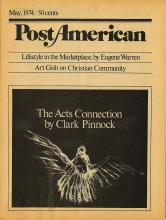The Anabaptists were right when they said that we cannot be Christians by ourselves. We need our brothers and sisters to help us along the way. That means to be Christian we need to be part of a community of faith. Community is not an added attraction or something optional, but an essential part of God's will for all God's people.
The images of community and peoplehood run throughout the Bible.
God created us for conversation and dialogue and from the beginning has been calling out for a people. God said to the Israelites, "If you will obey my voice and keep my covenant, you shall be my own possession among all peoples ... and you shall be to me a kingdom of priests and a holy nation" (Exodus 19:5-6). The New Testament talks of the new covenant, the koinonia, the body of Christ. The images are of community.
There is little room for the modern heresy of individualism.
We need our brothers and sisters. All of us are weak and need the support and encouragement of others. Seldom do we have the courage to stand alone, but we can stand up and be counted if we know our brothers and sisters are standing with us. To resist all the pressures to conform to the sick world around us, we need support. We need our brothers and sisters for sharing because we cannot hold within ourselves all of our joys and sorrows, hopes and fears, faith and doubts. The closer we are drawn to God, the closer we come to others in the faith, just as the more we love each other the closer we are drawn to God. The more we love each other the more we want to share. Even our possessions cannot be considered our own any longer.
Read the Full Article

